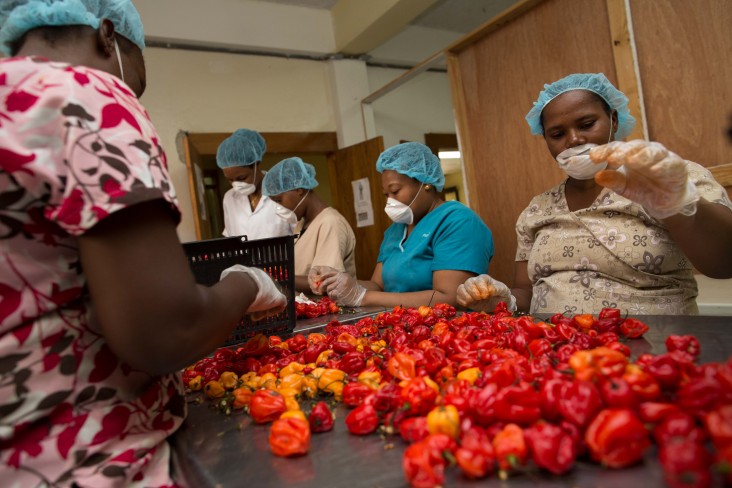
Overview
Local Solutions Fact Sheet 2017 ![]() (pdf - 385k)
(pdf - 385k)
Local institutions– private sector partners and civil society organizations– serve as engines of growth and opportunity in Haiti. In addition to its traditional partnership with the Government of Haiti (GOH), a key part of the United States Agency for International Development’s (USAID)’s strategy is to improve the capacity of Haitian institutions and organizations, while at the same time ensuring rigorous oversight of funds. This includes working with non-governmental organizations (NGOs), the private sector, cooperatives, associations and universities. By forming local partnerships, USAID not only makes its work more effective, but inherently more sustainable and reduces the need for foreign aid over time
USAID Strategies & Activites
In 2016, USAID set aside more than $25 million for capacity development services and grants to Haitian organizations. Currently, USAID works with Haitian awardees to improve the country’s health, education, agriculture, economic and human rights sectors.
In order to increase opportunities for direct funding to Haitian organizations, USAID launched the Konbit project to provide management, administrative and financial capacity building services to current and potential partners and ensure USAID solicitations reach local audiences.
Local Partnerships
Water, Sanitation and Health Projects:
AKSYON (Fonkoze): Capacity-building for community health workers, peer educators, mother-leaders and local promotors to improve nutrition with FONKOZE, a local micro-finance institution.
Fondasyon Kole Zepòl Sanitation Project (Fonkoze): Eliminating open-air defecation in ten rural communities.
Zanmi Lasante: Reducing the frequency and transmission of cholera and waterborne diseases in the Central Plateau by educating community members, renovating school bathroom facilities and improving access to safe drinking water.
J/P Haitian Relief Organization: Improving access to safe drinking water, renovating school bathroom facilities as well as educating staff, students, parents and community members.
Strengthening the Economic and Agriculture Sectors
La Fondation Haïtienne de Développement Agricole Durable/FONHDAD (Haitian Sustainable Agricultural Development Foundation): Operating two grain processing centers for maize and sorghum and improving access to motorized equipment for small-scale farmers.
AGRITECH: Establishing a model and low-cost traceability system for mangoes in order to comply with U.S. regulations and helping small-scale Haitian mango producers reach American markets.
Montrouis Management Association for the Rural Center of Sustainable Development: Protecting farming irrigation systems for nearly 1,200 hectares by improving shoreline protection of ravines near irrigation and strengthening the Association of Irrigators of Côte des Arcadins.
Youth Development Initiative (IDEJEN): Strengthening the workforce in the apparel and construction sectors by providing training, apprenticeship and certification.
Centre de Formation et d’Encadrement Technique (Training and Coaching Center): Helping to formalize and enhance the growth potential of the micro-, small- and medium-sized enterprises of the Côte-des-Arcadins and St. Marc area.
Build Change: Providing training, apprenticeship and certification for youth employment in the construction sector through the Haitian REZO network, an affiliation of private sector businesses and construction professionals dedicated to the promotion of products and services that meet the requirements of the National Construction Code of Haiti.
Addressing Needs of vulnerable groups
GHESKIO: Offering a holistic gender-based violence program that provides health services, counseling, and vocational training for victims; training for women-focused networks; and public awareness training.
Zanmi Lasante: Comprehensively responding to cervical cancer, including screening services, to prevent the leading cause of death for women in Haiti.
Societe Haitienne d'Aide aux Aveugles (Haitian Society for Aid to the Blind): Promoting inclusive education for children who are blind and visually impaired in Port-au-Prince and Cap Haïtien.
Christian Service to Haiti: Increasing employment opportunities for disabled individuals and their families through academic and vocational training.








Comment
Make a general inquiry or suggest an improvement.